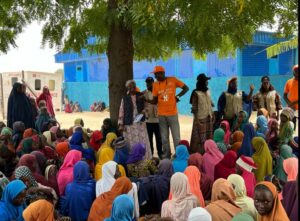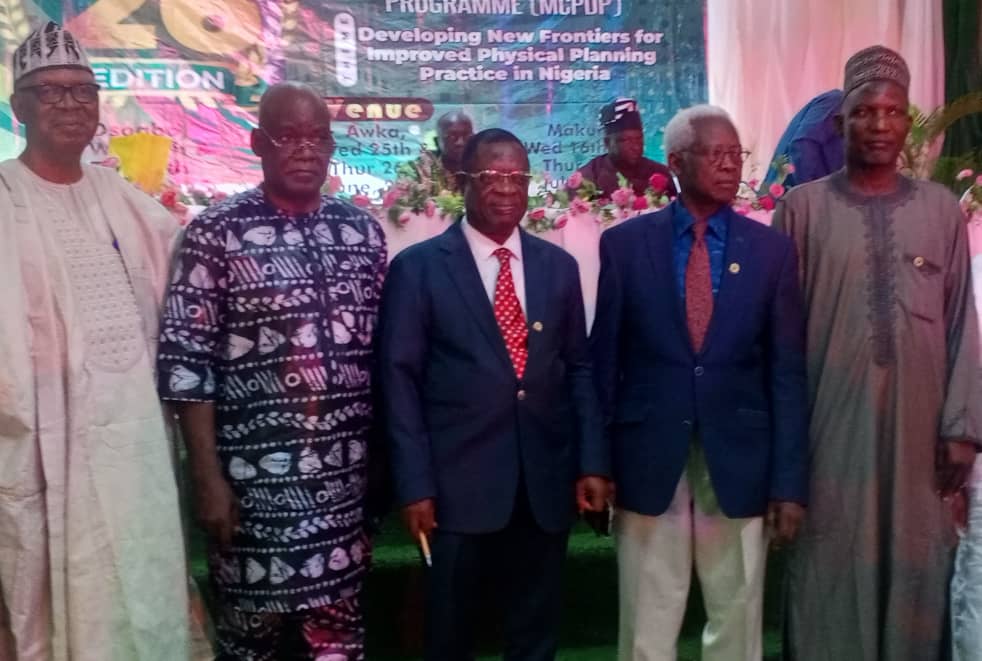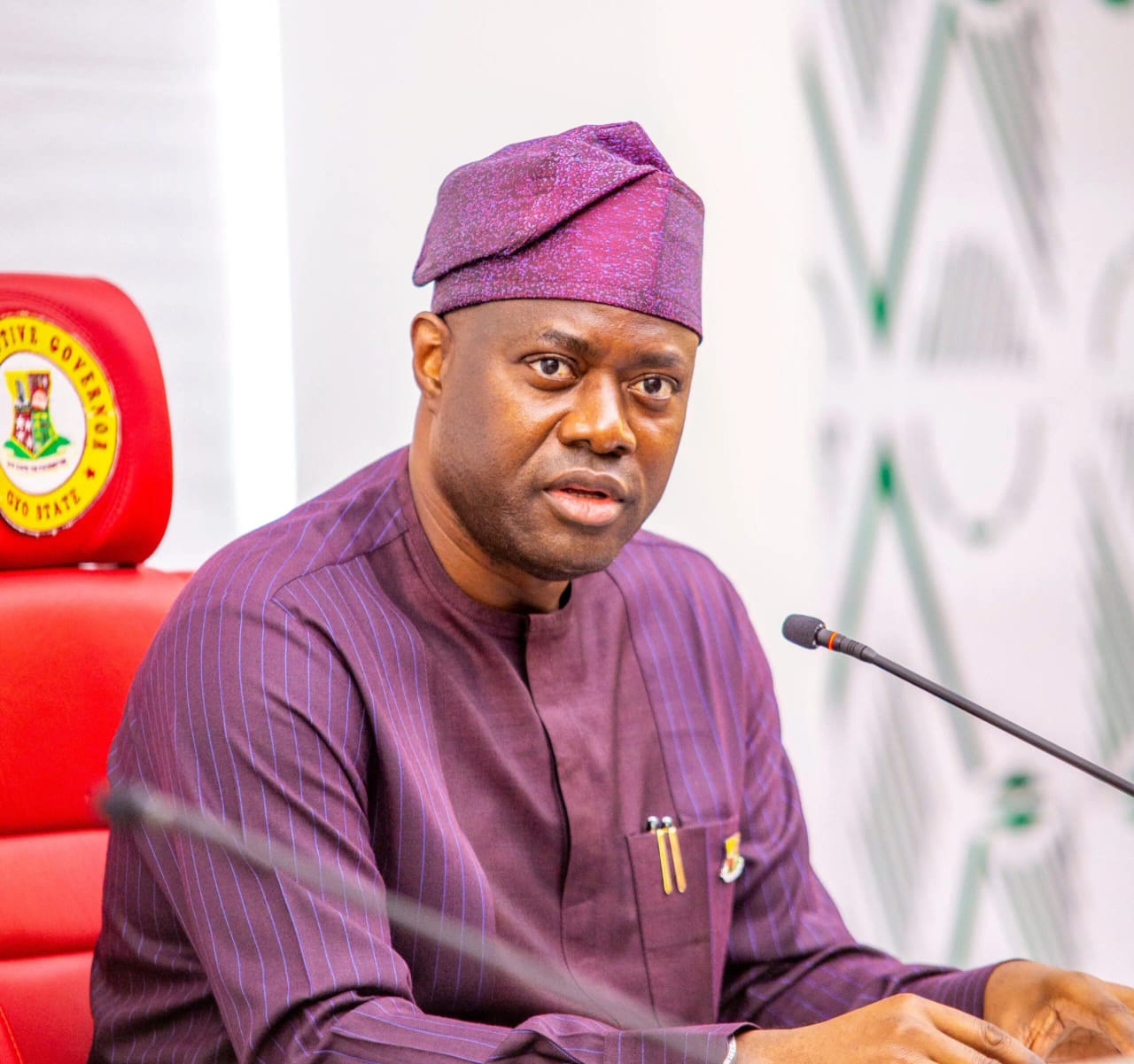Uncategorized
Borno IDPs Laud UNFPA’s Humanitarian Interventions, Empowerment

Internally Displaced Persons (IDPs) in Maiduguri have lauded the United Nations Population Fund (UNFPA) for providing humanitarian services for the vulnerable population in Borno.
The IDPs made the commendation during an assessment tour by a team from the UNFPA headquarters in Abuja to the Muna Elbadawy camp in Maiduguri.
Zainab Modu, 38-year-old IDP from Mafa Local Government Area, commended the fund for providing comprehensive healthcare and rehabilitation to survivors of Gender-Based Violence (GBV), and supporting young girls through empowerment and skill acquisition training.
Modu acknowledged that the fund had provided dignity kits and psychosocial counselling services, as well as skills training to them at the “safe space’’ established by the UNFPA.
Rreports also said that the “safe space” is a complete setting funded by donors, namely Norway, Canada, Denmark and the Korea International Cooperation Agency (KOICA), through the UNFPA to ensure the safety and protection of women and adolescent girls.
The “safe space” serves as meeting point for women and girls to freely express themselves and share their grievances, with skills acquisition section where hands-on skills are taught such as pomade and traditional cap making, while ante natal and family planning services are also given to the women.
Anothe IDP, Salamatu Haruna, also said that she lost her father while trying to escape from Boko Haram attack in Mafa before they came to the camp with her mother and siblings.
Haruna said she was rehabilitated in the safe space and empowered with a tailoring machine which has become her major source of income.
Yangana Babagana, another IDP, said she was comfortably delivered of her baby at the camp as she embraced the antenatal and psychosocial support services provided by the fund at the camp.
Similarly, Yachellu Ari-Kime, a 45 year old mother of eight, said that the fund provided a platform that ensures women and girls in all their diversity are empowered to exercise their sexual and reproductive health and rights and make autonomous decisions about their bodies free from coercion, violence and discrimination.
Ari-Kime said that in the past, some families give out their daughters in marriage at the age of 12 years old, which in most cases, resulted in complications during childbirth and maternal mortality.
“But through the education programmes and sensitisation provided by the UNFPA, women are now avoiding early marriages and now have better understanding toward their health and hygiene.
“And this has improved access to maternity care, prevention and treatment of childbirth complications, including how to avoid obstetric fistula,” she said.
She acknowledged that the fund had also trained her in liquid soap making, detergent and pomade production, among others.
On her part, 24-year-old Fauziya Muhammed, another IDP from Marte Local Government Area, said she lost her son and husband to the insurgency and was able to escape from dangers and ended up at the Muna Elbadawy camp in Maiduguri since 2017.
She added that she was taught how to help curb Sexual Gender-Based Violence (SGBV) and
had been receiving humanitarian and psychosocial support from UNFPA since she settled in the camp.
She said “women and girls are mentored not only on issues surrounding them, but they are taught to know when there is GBV, which can happen outside and in their homes by strangers or even family members.”
According to her, the GBV reporting mechanism has helped women to seek redress whenever their rights are violated, narrating the case of a Civilian Joint Task Force member who attempted to rape an IDP and was severely reprimanded.
Anthony Juguna, the UNFPA GBV Programme Specialist, said that the reproductive healthcare programmes for women, and the campaigns against GBV were supported and co-funded by partners like the Danish Government, through its Ministry of Foreign Affairs.
Juguna said that through the support from the USAID’s Bureau for Humanitarian Assistance (BHA), the Fund provides life-saving humanitarian assistance, including food, water, shelter, emergency healthcare, sanitation and hygiene, and critical nutrition services to vulnerable communities.
He explained that the Norwegian Government supported UNFPA to scale up Sexual and Reproductive Health (SRH) services, including SGBV prevention and response.
According to him, the UNFPA and the Korea International Cooperation Agency (KOICA), in collaboration with Borno Government, particularly the Borno ministries of health, women affairs, as well as budget and planning, have since 2018, been providing humanitarian assistance to displaced women, girls and vulnerable people.
He said the collaboration assisted in increasing access to comprehensive maternal and child healthcare and fistula care.
On her part, Hajiya Kori Habib, the Media Associate of the UNFPA in Nigeria, said that the visit to the camp was to access some of the support being provided by the donors, as well as interact with the beneficiaries.
Habib said that the safe space was designed to help women and girls interact on issues affecting them.
She explained that the women were taught some skills in the area of making hand-woven caps, perfumes and soap local superghetti, tailoring and other skills.
“Some have already gotten the skills even as they come here so they share the knowledge among themselves but also make ends meet through the acquired skills.
“We have those who monitor and counsel them where we have people advocating against Gender Based Violence, prevention, referral mechanisms, as well as case management. All these things are done so that they can get that protection, discussing and seeking for support.
“Some of the women find it difficult when they come here to discuss issues affecting them, so, there are those who go out to the communities to sensitise them on how to take care of their bodies. They also have a section to direct them for legal service when rape cases occur.
“In the ante natal section, the women are provided family planning services, while in the aspect of GBV, they get helping aids like the whistle to raise alarm whenever they find themselves in any form of trouble.” (NAN)
Uncategorized
Town Planners Task Benue Govt On Regional Devt, Master Plans

By David Torough, Abuja
The President, Nigerian Institute of Town Planners (NITP), Dr. Chime Ogbonna, has urged the Benue State Government to urgently undertake a comprehensive regional development plan and master plans to begin implementing long-overdue urban planning policies across the state.
He made the call on Wednesday in Makurdi during the opening ceremony of the 26th Mandatory Continuing Professional Development Programme (MCPDP), hosted by the NITP in conjunction with the Town Planners Registration Council of Nigeria (TOPREC).
Addressing town planning professionals from across the country, Dr. Ogbonna decried the glaring shortfall of town planners in Benue and the administrative confusion surrounding physical planning in the state.
“From what we saw during the town hall meeting, there’s a dangerous absence of coordinated planning,” he said. “The Benue State Government needs to develop and implement a regional plan for the entire state and establish master plans for all urban areas.”
He warned that without deliberate planning, even small settlements in Benue state, which are bound to grow into urban areas will culminate into chaotic development. “Planning is not just for Makurdi. Every settlement, no matter how small, deserves a guide for growth,” he emphasized.
Dr. Ogbonna also advocated for the full implementation of Nigeria’s 1992 Urban and Regional Planning Law, saying it is the only way to ensure equitable and sustainable development across Benue’s urban and rural areas.
In a keynote address delivered on behalf of the President of TOPREC, Isyaku Muhtar Kura, the council’s representative, Tpl Prof. Timothy Gyuse, emphasized the need for innovation in tackling emerging urban planning challenges.
He described the MCPDP not just as a statutory event but also a platform to equip planners with modern tools, strategies, and collaborative approaches for building resilient communities.
“This training must go beyond routine. It’s a call to prepare for a future where sustainable cities become the norm,” he said.
The program has been billed to take place this year in three venues namely: Osogbo, Awka, and Makurdi. Osogbo and Awka have already hosted the programme while Makurdi is now hosting the 3rd and final leg of the programme.
Declaring the event open, Governor Hyacinth Alia, represented by the Director-General of Benue Geographic Information Service (BenGIS), Prof. Daniel Amine, welcomed the dialogue and promised government action on the planners’ recommendations.
“If you don’t plan, you will plan to fail,” Prof. Amine asserted. “This workshop has raised critical issues. We will expect formal communication from your institute, and we shall present it to the governor for prompt action.”
Prof. Amine praised Governor Alia’s commitment to urban development, noting that three senior staff of the BenGIS are certified town planners.
However, he cautioned against unregulated construction in the state. “If we allow people to build wherever they want, one day you may not even be able to drive out of your home,” he warned.
Amine also challenged NITP and TOPREC to hold their members accountable, especially those who contribute to planning irregularities. “Your institute must be ready to sanction planners who cause confusion,” he added.
In his remarks, the chairman of the MCPDP planning committee, Dr. Osunsanmi Gbolabo, expressed gratitude to participants and reiterated the historical importance of the training.
He said the MCPDP, now in its 26th year, has evolved to meet the dynamic demands of the profession. “We are not just shaping spaces; we are shaping futures,” he said, highlighting new syndicate sessions and smart training methods introduced to enhance the learning experience.
Several other speakers took the stage, including Dr. Jesse Nor, NITP’s National Public Relations Secretary, emphasized that the MCPDP is a vital platform to sharpen skills and improve planning outcomes in Nigeria’s growing cities.
“For this year, Makurdi was chosen among the other three venues to host the program. The Makurdi venue is thus the last leg of the program for the year.
Indeed, the MCPDP is a gathering of city planners to explore new frontiers of knowledge, training, and skill development, and how all of these influence planning practice and with the overarching aim of developing our towns, regions and cities in a sustainable manner”, he stated.
A highlight of the event was a paper presented by by Dr Osunsanmi Ogbolabo, on behalf of Prof. Ayo Olajuyigbe, of the Federal University of Technology, Akure, who traced the origins of town planning from ancient civilizations to contemporary practices. He stressed the need for financial and political will to enforce master plans, pointing to widespread violations due to weak implementation and institutional gaps.
In another presentation, Tpl Patrick Nyame, on behalf of Dr. Daniel Adamu from Nasarawa State University, advocated for strategic synergy between governments, ministries, private sectors, and non-state actors.
“Collaboration is not weakness; it’s wisdom. Government alone cannot achieve the level of development we seek,” he said.
The MCPDP, which began with a town hall meeting on Tuesday, will run through Thursday, featuring further presentations and roundtable discussions aimed at addressing Nigeria’s growing planning concerns and generating policy-focused solutions for sustainable development.
| ReplyReply allForwardAdd reaction |
Uncategorized
Decline in Global Aid to Africa: President Maada Bio of Sierra Leone, Gov Makinde Champion Agriculture-Led Transformation for Africa’s Future

By Mike Odiakose, Abuja
As global aid to Africa declines, Oyo State Governor Seyi Makinde joins the President of Sierra Leone, Julius Maada Bio and global development experts Dr. Simeon Ehui, Director General of the International Institute of Tropical Agriculture (IITA), and Dr.
Hafez Ghanem, Senior Fellow at Brookings Africa, in a powerful call for agriculture-led transformation to drive the continent’s development.In a new article published by Brookings Africa, they outlines a visionary path for Africa to harness its vast agricultural potential, with Oyo State and Sierra Leone’s #FeedSalone initiative serving as inspiring models of progress.
Titled “With declining global aid, Africa must cultivate its own growth,” the Brookings Africa article emphasizes that agriculture is Africa’s greatest asset for achieving self-reliance and economic prosperity.
Governor Makinde, a leading advocate for agribusiness, highlights Oyo State’s transformative efforts, such as the revitalization of the Fashola Agribusiness Hub, which has boosted food production and created jobs for thousands.
“Our fields are our future,” Makinde stated.
“By investing in agriculture, we are not only feeding our people but also building a foundation for sustainable economic growth.”
Oyo State’s agricultural revolution under Makinde’s leadership includes modernized farming techniques, expanded access to credit for farmers, and infrastructure projects like the 34-kilometer Oyo-Oke Ogun road, connecting rural farmers to markets.
These initiatives align with the article’s call for policies that prioritize productivity, innovation, and market access to transform African agriculture.
Drawing inspiration from Sierra Leone’s #FeedSalone program, which has increased local food production and reduced import dependency, the article underscores the need for African-led solutions.
Dr. Ehui, whose IITA is headquartered in Oyo State, praised Makinde’s commitment to agribusiness, noting, “Oyo State’s model demonstrates how strategic investments in agriculture can drive food security and economic resilience.”
Dr. Ghanem added, “Africa’s youth and arable land are unmatched assets.
Leaders like Governor Makinde are showing how to turn potential into prosperity.”
The Brookings Africa article calls for a continent-wide shift toward agriculture-led development, urging African governments to invest in rural infrastructure, technology, and youth empowerment.
Governor Makinde’s policies in Oyo State, including the Agribusiness Development Agency and partnerships with IITA, exemplify this vision, positioning the state as a hub for agricultural innovation.
As Nigeria and Africa face economic challenges, Makinde’s leadership offers a blueprint for self-reliance.
“We cannot wait for external aid to solve our problems,” Makinde said. “Our greatest potential lies in our fields, and together, we can cultivate a brighter future for Africa.”
Uncategorized
Concentrate on Edo Devt, not Obaseki Probe, Wike Counsels Okpebholo

By Laide Akinboade, Abuja
The Minister of the Federal Capital Territory (FCT), Nyesom Wike has urged the Governor of Edo State, Sen. Monday Okpebholo to concentrate on the development of the State, rather than dissipating his energy and resources to probe of his immediate predecessor, Godwin Obaseki.
Wike, who spoke in Benin, Edo State on Sunday said probing the former governor will achieve no meaningful results, adding that it was better for Governor Okpebholo to deploy his time and the State resources towards achieving his developmental goals Edo State and its people.
According to a statement by his Senior Special Assistant on Public Communications and Social Media, Lere Olayinka, the FCT Minister Wike said; “If there is someone who would have encouraged Okpebholo to probe and prosecute Obaseki, that person should be me, but what I suffered in ensuring that he returned for a second term and how he paid me back is now in the past.
“We must pass through this process in life, move on for the development of Edo State. Don’t do it, I’m the one that should have told you to pursue this man, I know what I passed through.
“I should be the one to prosecute Obaseki but what is it in life when God has given you your position. If it were to be his power, you wouldn’t be here, but God has told him, you don’t have it and I have given it to whom I want to give.”
Facing former Governor of Edo State, Senator Adams Oshiomhole, Wike said; “Leader, I know how pained you are and what you passed through, I know the sufferings, you suffered and it was like a humiliation to you. I was part of it because I humiliated you.
“I apologized on national TV to you, sorry for what I did to you, leave it and let them carry their wahala and go, focus on the development of Edo and you will see what you will achieve at the end of the day.”
Wike was in Benin, Edo State yesterday, to commission the New Edo Line terminal, which is the second phase of the Edo State Benin Central Bus Terminal, today. The event was however cancelled owing to the death of former President Muhammadu Buhari.


















